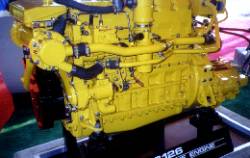Be Kind to Your Machine!!
If you did not receive a manual with your engine, get one. Diesel manuals contain every bit of information you need to know about how to maintain your engines, and more. We provide here some common sense maintenance tips but to be totally familiar with your engine makes you a better boater. With proper maintenance your engines should exceed the expected lifespan.
Lubrication
Few people are unaware that diesel lube oil must be changed frequently, 100 hours is the usual interval. Why so often? It’s because large amounts of carbon is a by-product that ends up in the oil. If allowed to build up and remain in the oil, the lubricating ability of the oil is severely retarded. Moreover, carbon blocks heat transfer and retards the cooling function of the oil as well. Engine oil will also suffer a build up of sulfuric acid, which can damage bearings as shown above.
Equally important is good filters and lubricant. Only the very best and most expensive oil filters are good enough to be significantly effective. You should use either OEM or top name brand filters regardless of cost. Also follow the engine manufacturer’s recommendation for oil grades.
Engine Gaskets
Leaking gaskets should not be ignored. When you find a leaking gasket, you should replace all such gaskets. The leak usually means the gasket has exceeded it’s useful lifespan. It’s best to assume the related gaskets have as well. Also, the leaking of engine fluids will tend to disintegrate the engine paint and devalue the system. If you see fluids in your engine pan or bilge, look for the source.
Engines Vibration
Your engines should run smoothly. Any vibration is unnatural and will damage your engines and related systems. The vibration will break gasket surfaces loose, loosen hoses, the engine is going to start leaking fluids and your engine mounts will be destroyed. Most vibration is caused by mis-alignment, improper shaft alignment or damaged props. Engine vibration should always be checked by a professional.
Engine Alarms
Engine alarms are the most important piece of equipment aboard. They will, however, fail at some point. They deserve constant maintenance and inspection to ensure that you do not damage your engines. Make sure you have audible alarms and that the lights work. Every time you start the engines, as a preface you should hear the alarm. This is a test – do not panic. After the engine starts, the buzzer should stop. It is always a good idea to look overboard to see if your engine is pumping water. Temperature alarms will not work until the engines get hot.
Engine Coolers
All diesel will have at least three coolers: the heat exchanger, oil and fuel cooler — and most likely a transmission cooler. That makes four for a single engine boat, eight for twin. All of these coolers need to be inspected and serviced and have the zincs changed at least annually.
- Coolers use seawater which will cause corrosion.
- Accumulated salt build-up limits flow through the coolers.
- Small debris and particles can evade your seawater strainer and clog coolers
Cooling System Maintenance
Diesel engines operate under a piston compression of around 350 to 550 psi. That is three to four times the amount of a gas engine. This high compression puts great strain on the engine and can build up heat very rapidly (like within 60 seconds) if there is a failure in the cooling system. Diesel cooling systems are vastly more critical than gas engine cooling systems. Gas engines can suffer from numerous moderate overheats without causing catastrophic damage. THIS IS NOT TRUE OF DIESELS. Diesel engines can and will suffer serious damage even as the result of relatively minor overheat conditions. This is because the overheating occurs so rapidly, and because the internal parts are less tolerant of damage than a gas engine.
Most overheats occur because of poor maintenance. Proper maintenance should include:
- Cooling system hoses inspected and replace when brittle or suspect.
- Cooling system should be periodically cleaned
- Proper ratio of coolant/water should be added when needed
- Engine coolant in the engine checked every time before starting the engine.
Fuel System
Fuel system problems generally do not cause engine damage, but will cause damage to the fuel system or leave you stranded. Most boats will have a good Racor – type filter. Most fuel system problems are a result of dirty filters or contaminated fuel. You should inspect your filters regularly and carry spares on board. If you find water in the filter, it is most likely also in your tank. Water in the tank can come from a variety of sources, but in any case, it should be remedied. Check for a leaking fill cap or a clogged vent line. A clogged vent line will allow condensation to build up in the tank. If you anticipate a lot of usage, it is good to keep full tanks because it eliminates condensation. However if you don’t use much fuel, carrying around a full tank of “aged” fuel is not wise. As fuel ages it will begin to gum up injectors. Many owners are now installing fuel polishing (or cleaning) systems which constantly clean your fuel. If you’ve ever had to dispose of a full tank of diesel, you will find the system will pay for itself.
Engine Air Filter
As one would expect, engines need clean air. However in your engine room there are tons of contaminants including: salt, sand, deteriorated insulation, etc. Check your air filter often. If not installed properly, it can let in contaminates, if not clean it will not allow adequate air for the engine. Also be sure there is adequate ventilation in the engine room. Inadequate ventilation will cause engine overheating. You can tell when this condition is present when, under way, you go to lift an engine hatch or door and there is a vacuum fighting against it. Many times engine room vents will be clogged – check this first if you suspect a problem. It is fairly inexpensive to add more ventilation if necessary.
Basic Service Recommendations
- Most Important – Follow your manufacturer’s recommendations
- Conduct a basic engine survey at beginning of season. This includes all gaskets, hoses, belts and wiring. If you aren’t a confident trouble-spotter, use a professional
- Inspect sea water pump impellers biannually.
- Take engine temperatures with infrared gun annually.
- Clean and service cooler systems annually
- Open up and inspect the sea water pump and check condition annually.
- Conduct thorough cooling system inspection and cleaning every two years
- Change engine coolant annually.
- Inspect sea water pump impellers annually.
- Conduct cooling system inspection and cleaning every two years.
- Change engine oil prior to lay up.
- Change engine coolant every two years.
 If you did not receive a manual with your engine, get one. Diesel manuals contain every bit of information you need to know about how to maintain your engines, and more. We provide here some common sense maintenance tips but to be totally familiar with your engine makes you a better boater. With proper maintenance your engines should exceed the expected lifespan.
Lubrication
Few people are unaware that diesel lube oil must be changed frequently, 100 hours is the usual interval. Why so often? It’s because large amounts of carbon is a by-product that ends up in the oil. If allowed to build up and remain in the oil, the lubricating ability of the oil is severely retarded. Moreover, carbon blocks heat transfer and retards the cooling function of the oil as well. Engine oil will also suffer a build up of sulfuric acid, which can damage bearings as shown above.
Equally important is good filters and lubricant. Only the very best and most expensive oil filters are good enough to be significantly effective. You should use either OEM or top name brand filters regardless of cost. Also follow the engine manufacturer’s recommendation for oil grades.
Engine Gaskets
Leaking gaskets should not be ignored. When you find a leaking gasket, you should replace all such gaskets. The leak usually means the gasket has exceeded it’s useful lifespan. It’s best to assume the related gaskets have as well. Also, the leaking of engine fluids will tend to disintegrate the engine paint and devalue the system. If you see fluids in your engine pan or bilge, look for the source.
Engines Vibration
Your engines should run smoothly. Any vibration is unnatural and will damage your engines and related systems. The vibration will break gasket surfaces loose, loosen hoses, the engine is going to start leaking fluids and your engine mounts will be destroyed. Most vibration is caused by mis-alignment, improper shaft alignment or damaged props. Engine vibration should always be checked by a professional.
Engine Alarms
Engine alarms are the most important piece of equipment aboard. They will, however, fail at some point. They deserve constant maintenance and inspection to ensure that you do not damage your engines. Make sure you have audible alarms and that the lights work. Every time you start the engines, as a preface you should hear the alarm. This is a test – do not panic. After the engine starts, the buzzer should stop. It is always a good idea to look overboard to see if your engine is pumping water. Temperature alarms will not work until the engines get hot.
Engine Coolers
All diesel will have at least three coolers: the heat exchanger, oil and fuel cooler — and most likely a transmission cooler. That makes four for a single engine boat, eight for twin. All of these coolers need to be inspected and serviced and have the zincs changed at least annually.
If you did not receive a manual with your engine, get one. Diesel manuals contain every bit of information you need to know about how to maintain your engines, and more. We provide here some common sense maintenance tips but to be totally familiar with your engine makes you a better boater. With proper maintenance your engines should exceed the expected lifespan.
Lubrication
Few people are unaware that diesel lube oil must be changed frequently, 100 hours is the usual interval. Why so often? It’s because large amounts of carbon is a by-product that ends up in the oil. If allowed to build up and remain in the oil, the lubricating ability of the oil is severely retarded. Moreover, carbon blocks heat transfer and retards the cooling function of the oil as well. Engine oil will also suffer a build up of sulfuric acid, which can damage bearings as shown above.
Equally important is good filters and lubricant. Only the very best and most expensive oil filters are good enough to be significantly effective. You should use either OEM or top name brand filters regardless of cost. Also follow the engine manufacturer’s recommendation for oil grades.
Engine Gaskets
Leaking gaskets should not be ignored. When you find a leaking gasket, you should replace all such gaskets. The leak usually means the gasket has exceeded it’s useful lifespan. It’s best to assume the related gaskets have as well. Also, the leaking of engine fluids will tend to disintegrate the engine paint and devalue the system. If you see fluids in your engine pan or bilge, look for the source.
Engines Vibration
Your engines should run smoothly. Any vibration is unnatural and will damage your engines and related systems. The vibration will break gasket surfaces loose, loosen hoses, the engine is going to start leaking fluids and your engine mounts will be destroyed. Most vibration is caused by mis-alignment, improper shaft alignment or damaged props. Engine vibration should always be checked by a professional.
Engine Alarms
Engine alarms are the most important piece of equipment aboard. They will, however, fail at some point. They deserve constant maintenance and inspection to ensure that you do not damage your engines. Make sure you have audible alarms and that the lights work. Every time you start the engines, as a preface you should hear the alarm. This is a test – do not panic. After the engine starts, the buzzer should stop. It is always a good idea to look overboard to see if your engine is pumping water. Temperature alarms will not work until the engines get hot.
Engine Coolers
All diesel will have at least three coolers: the heat exchanger, oil and fuel cooler — and most likely a transmission cooler. That makes four for a single engine boat, eight for twin. All of these coolers need to be inspected and serviced and have the zincs changed at least annually.

